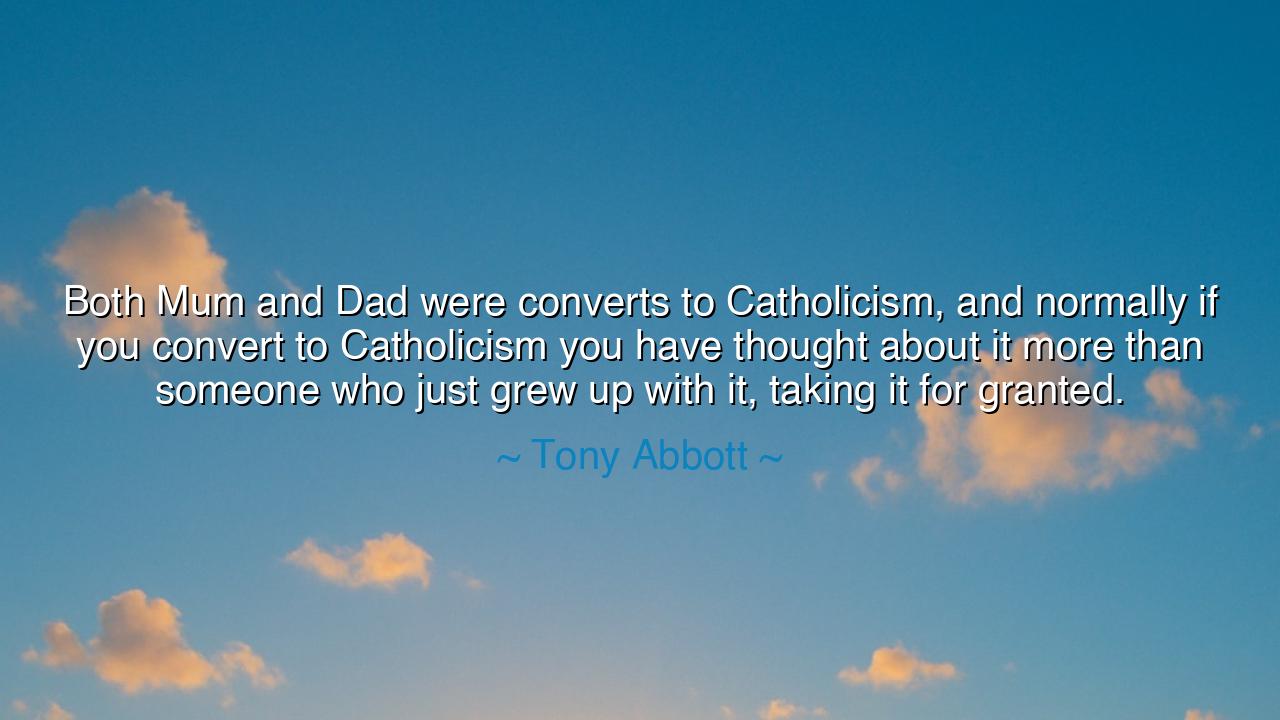
Both Mum and Dad were converts to Catholicism, and normally if
Both Mum and Dad were converts to Catholicism, and normally if you convert to Catholicism you have thought about it more than someone who just grew up with it, taking it for granted.






Hearken, O seekers of wisdom, to the reflection of Tony Abbott, who observes: “Both Mum and Dad were converts to Catholicism, and normally if you convert to Catholicism you have thought about it more than someone who just grew up with it, taking it for granted.” In these words lies a meditation upon faith, choice, and the depth of reflection that comes with conscious devotion. Abbott reminds us that belief forged through deliberation and personal journey carries a different weight and clarity than that inherited by mere custom, revealing the power of conscious commitment in shaping both character and understanding.
From the earliest civilizations, philosophers recognized the value of choice and deliberation in matters of the soul. In Athens, Socrates praised the examined life, teaching that virtue and understanding are most profound when sought through inquiry rather than inherited unexamined. Abbott’s reflection mirrors this ancient principle: those who adopt belief through contemplation, rather than passive reception, engage more fully with its tenets, embracing responsibility, awareness, and intentionality in the practice of faith.
The words illuminate the distinction between inherited tradition and deliberate conversion. To be born into a belief is to receive it as given; to choose it is to wrestle with questions, doubts, and understanding, and emerge with conviction. Consider the story of St. Augustine, who struggled with uncertainty and temptation before embracing Christianity. His conversion was not mere inheritance but a triumph of contemplation and self-reflection, endowing his faith with profound depth and enduring influence. Abbott’s parents, as converts, embody this conscious engagement with belief, shaping their lives with intention rather than assumption.
Abbott’s observation also speaks to the transformative power of choice. The act of conversion requires the individual to examine assumptions, confront doubts, and commit with full awareness. Such deliberation strengthens resolve and deepens understanding. History shows that those who engage in faith through conscious choice, rather than mere tradition, often become beacons for others: Thomas More, who embraced and defended his conscience with deliberate thought, stands as a testament to the courage of reflective belief.
Furthermore, the reflection underscores the lesson that awareness enhances virtue. Faith adopted consciously nurtures not only adherence to ritual but the cultivation of moral and ethical reflection. Abbott implies that the process of conversion demands a mind awake to responsibility, ethics, and the implications of belief. Those who inherit faith without reflection may take it for granted, while deliberate seekers are compelled to act with intentionality and integrity.
From this meditation emerges a timeless teaching: embrace reflection and choice in matters of belief, principle, and values. To examine, question, and decide consciously strengthens conviction and prepares one to live with purpose, courage, and moral clarity. Abbott’s insight reminds us that thoughtful engagement produces commitment that is both durable and transformative, capable of guiding action and shaping character.
Practical counsel flows naturally: examine your assumptions, question inherited beliefs, and engage actively with the principles you choose to uphold. Seek understanding through study, dialogue, and introspection. Whether in faith, ethics, or personal values, deliberate choice imbues life with clarity, responsibility, and strength, transforming adherence into living conviction.
Thus, O listener, let the words of Tony Abbott illuminate your path: to adopt belief or principle consciously is to enter into its spirit with understanding, reflection, and intent. The journey of the convert, or the conscious seeker, exemplifies the wisdom of the ancients: thoughtful choice enriches conviction, strengthens character, and guides the soul with purpose, distinguishing life lived with awareness from life lived by mere inheritance.






AAdministratorAdministrator
Welcome, honored guests. Please leave a comment, we will respond soon